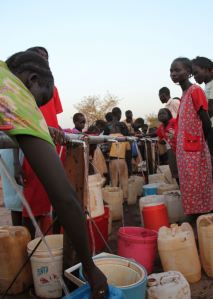This post is part of our special coverage South Sudan Referendum 2011 [1].
Southern Sudan will hold a referendum [2] on whether or not it should remain as a part of Sudan on 9 January 2011. It is most likely that Africa's largest country will split into two. Here's our latest roundup of blog posts about the referendum.
116,000 Southern Sudanese have left Northern Sudan since last October, Maggie Fick reports [3]:
116,000 (and counting*) Southern Sudanese people have left northern Sudan since late October. With only one week left before polling for the southern referendum starts, people are arriving en masse in southern state capitals at a pace that is quite clearly quickening.
 [4]
[4]Women and children gather water at a transit camp for newly arrived returnees in Aweil. Photo courtesy of Maggie Fick
Why are Southern Sudanese moving south in large numbers? [3]:
So why are southerners continuing to move south in large numbers despite the uncertainty about the future back home holds for them? Because they have reason to fear if their rights will be respected in northern Sudan following the referendum.
Magdi El Gizouli analyses President Omar Bashir's address to the nation during the 55th independence anniversary. He says [5], “Allowing the South to choose its own destiny in Bashir’s formulation constitutes “the last line in the nation’s book of healing”:
From this platform Bashir addressed the three issues of the day, the impending partition of the South, the conflict in Darfur, and the opposition’s demand for a political re-configuration in Khartoum on secession of the South. Regarding the South Bashir presented the choice between peaceful secession and war-ridden unity as the brave and democratic remedy to the chronic fissure in the organic whole. Allowing the South to choose its own destiny in Bashir’s formulation constitutes “the last line in the nation’s book of healing”, since peace, the ultimate target of his rule, is surely the truest embodiment of the country’s independence.
According to Yobu Annet, the disputed Abyei region may face serious commodity shortages [6] if the South secedes because most of the goods come from the North:
The business community in Abyei is very concerned – many think that secession may bring a economic downturn in the area. “If Abyei is annexed to the South then border trade may be affected”, said Chol Mayen, a businessman. “If it happens that the border is completely closed, we can still go to East Africa for goods.”
The referendum is a cause for anxiety for foreign traders [7] in Juba:
For Birungi Mary, a Ugandan trader who deals with vegetables in a Juba market, the referendum is cause for anxiety. “We are preparing to leave, and then come back after the referendum if there is no violence.”
Mary is one of thousands of traders in Juba, many of them from neighbouring countries, who are apprehensive about what the referendum will bring. Already suffering from rising prices on imported goods, many fear that referendum-related violence could disrupt business, and valuable goods could be destroyed.
In Konyokonyo and Jebel Markets in Juba, many foreign traders said they are going home for Christmas, and then wait till the referendum exercise is completed before returning.
South Sudan Info has created [8] a timeline [9]of Sudan headlines in 2010:
In 9 days, southern Sudanese are heading to the polls in a self-determination referendem to decide whether or not to establish Africa’s newest independent country. Last year was a landmark year, the last in the CPA’s six-year interim period which leads to the January 9, 2011 referendum.
Mishaps and Mayhaps observes that [11]a vote for anything but separation is not something many voters in Southern Sudan will tolerate:
one of many ominous signs cropping up in South Sudan as we approach the referendum, it is becoming increasingly clear that a vote for anything but separation is not something that many South Sudanese will tolerate. Granted, there have been 4 decades of war, resulting in millions of deaths, but this process is viewed by many within Southern Sudan simply as the final step in the road to secession, rather than an opportunity for true self-determination.
Take a look at Maggie Fick's visual representations [12]of “The Final Countdown” to Southern Sudan’s referendum:
The sheer amount of referendum-related signage in the southern capital is increasingly noteworthy. The latest posters from the Southern Sudan Referendum Commission urge registered voters to turn out on January 9. The vast majority of the posters and billboards, however, carry one clear message: separation is coming. These signs, courtesy of an assortment of civil society groups, feature the Southern Sudanese flag and a single raised palm, which is the symbol that appears on the referendum ballot.
For those who believe in prayers, join Scott and Meg Rambo [13]:
Would you join us in praying:
* for peace between North and South, but also between the various tribal groups.
* for peaceful resolution of the disputed areas; their borders and residents
* for a smooth, fair, peaceful referendum process.
* that the church in Sudan would continue to be a witness and a minister of reconciliation
* for reconciliation; between North and South, between government and rebels, between tribes, and most importantly between Sudanese people and God.
This post is part of our special coverage South Sudan Referendum 2011 [1].
